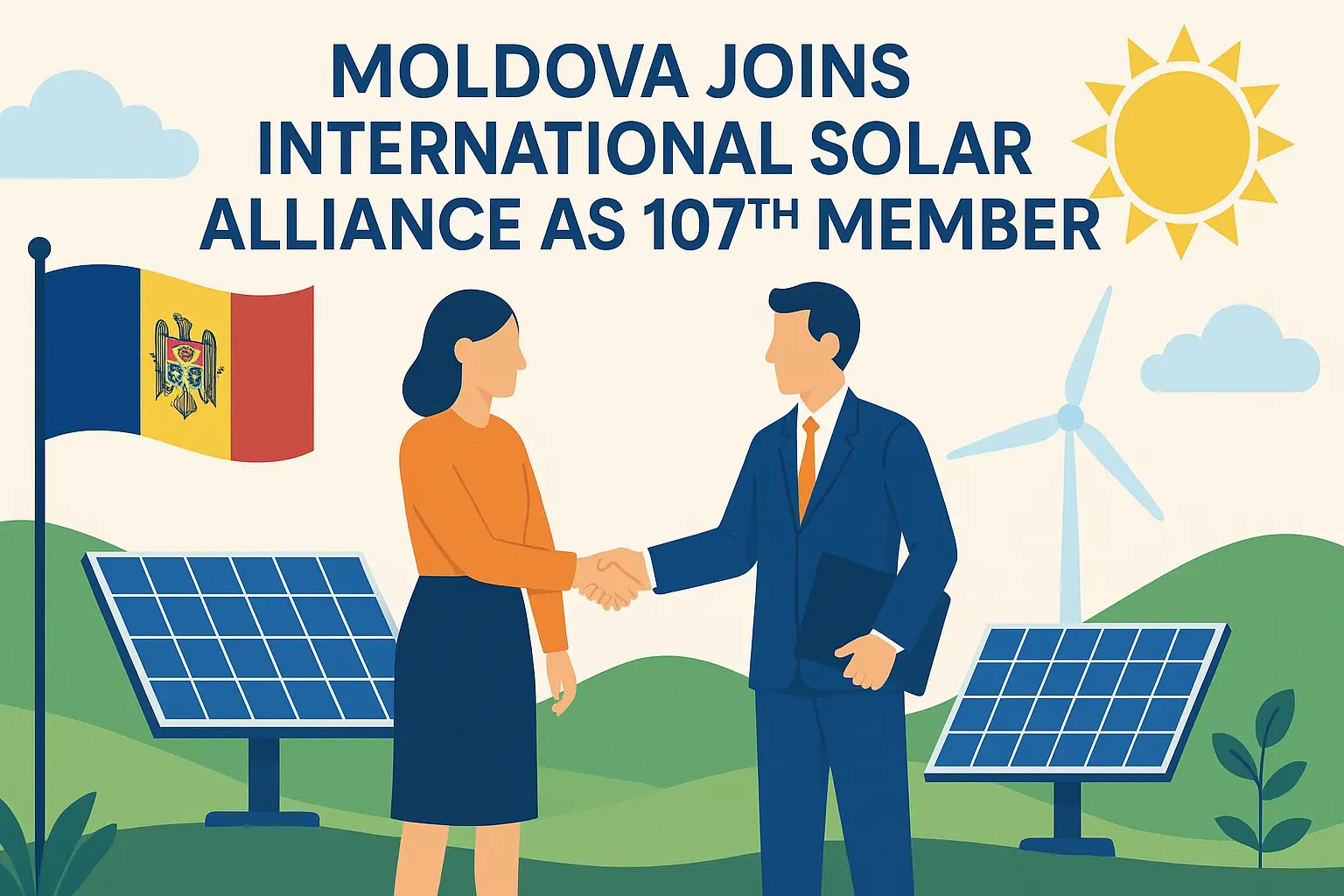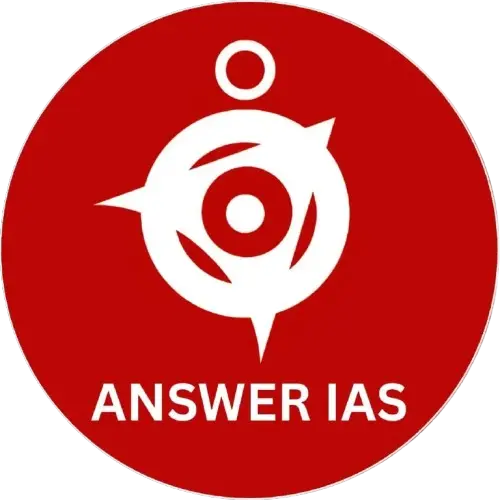
On August 4, 2025, Moldova joined the International Solar Alliance (ISA), becoming its 107th full member. The Ministry of External Affairs of India confirmed the accession.
The Instrument of Ratification was handed over in New Delhi by Ana Taban, Ambassador of Moldova to India, to P. S. Gangadhar, Joint Secretary (Economic Diplomacy) and Head of Depository of the ISA. Moldova now becomes part of a network of over 100 ratified members and 124 signatories, focused on scaling solar energy deployment worldwide.
The International Solar Alliance: From COP21 to a Global Platform
Launched in 2015 by India and France during COP21 in Paris, the International Solar Alliance began as a coalition of countries between the Tropics of Cancer and Capricorn. It aimed to promote affordable solar energy solutions.
In 2020, an amendment to the ISA Framework Agreement extended membership to all UN member states. This allowed countries outside the tropics, including Germany, the United States, and Norway, to join. It broadened the Alliance’s financial and technical reach.
The ISA is headquartered in Gurugram, India. India’s role in hosting the headquarters reflects its renewable energy targets—500 GW of non-fossil fuel-based capacity by 2030 and net-zero emissions by 2070—while also positioning it as a key participant in international climate cooperation.
Moldova’s Accession and Its Significance
Moldova’s membership comes at a time when solar adoption is seen as part of energy diversification strategies. As the 107th member, Moldova will have access to ISA policy support, investment mechanisms, and technical expertise.
Membership involves two steps: signing the Framework Agreement to become a signatory, followed by depositing an Instrument of Ratification to become a full member. This commitment indicates Moldova’s intention to participate in ISA programs, from capacity building to project development.
The “Towards 1000” Strategy
ISA’s Towards 1000 strategy sets four goals to be achieved by 2030:
- Mobilize USD 1 trillion in solar investments.
- Deliver energy access to 1 billion people.
- Facilitate 1,000 GW of solar capacity installations.
- Mitigate 1,000 million tonnes of CO₂ annually.
These targets support each other. Investments enable installations, which expand energy access and reduce emissions. The strategy is relevant for Least Developed Countries (LDCs) and Small Island Developing States (SIDS), where ISA focuses much of its support.
Programmatic Approach
ISA’s work is organized around three pillars:
- Analytics & Advocacy: Policy advice, data, and best practices.
- Capacity Building: Skills training through Solar Technology and Application Resource Centres (STAR-C).
- Programmatic Support: Implementing solar projects suited to local needs.
Moldova will have access to programs such as:
- Scaling Solar Applications for Agricultural Use (SSAAU), which has reduced solar pump prices globally by 50%.
- Affordable Finance at Scale, connecting members to funding and risk-mitigation tools.
- Solar Rooftop and Mini-Grids, for decentralized energy access.
Financing Solar Growth
The Global Solar Facility (GSF) is ISA’s blended finance risk mitigation platform, designed to attract private capital into underserved markets. By offering payment guarantees, insurance, and investment funds, the GSF addresses project risks and improves bankability.
Partnerships with the World Bank, Agence Française de Développement (AFD), and the Asian Development Bank provide additional resources. Moldova’s membership could lead to cooperation with European institutions for regional projects.
Challenges
ISA faces several constraints:
- High initial costs for solar installations.
- Energy storage limitations that affect reliability.
- Supply chain issues in panel manufacturing and raw materials.
- Uneven global investment, with Africa receiving less than 2% of new solar capacity despite high demand potential.
Addressing these issues requires investment, technology transfer, and policy adjustments.
Future Outlook
The One Sun One World One Grid (OSOWOG) initiative aims to connect countries through a global solar power grid. This would allow power sharing across time zones and weather patterns.
ISA is also expanding into areas such as solar-powered green hydrogen, battery waste recycling, and solar heating and cooling systems. The plan to create 30 STAR-Cs by 2026 will strengthen technical skills and project readiness.
For Moldova, participation in these projects offers opportunities to expand renewable capacity and reduce reliance on imported fossil fuels.
Conclusion
Moldova becoming the 107th member of the International Solar Alliance is a step toward broader cooperation on solar energy. The ISA’s Towards 1000 strategy aims to mobilize investment, expand energy access, install capacity, and reduce emissions on a global scale.
As membership grows, the Alliance strengthens its capacity to support countries in the global solar energy transition. Moldova’s entry reflects the recognition that solar cooperation benefits regions across different climates and economies, and that the transition to cleaner energy requires collective action.
Reviewed by: AnswerIAS
Disclosure: This article was researched and drafted with AI assistance and human editorial review for accuracy.
References
- ISA Official Website
- COP21 – UNFCCC
- World Bank – Renewable Energy Programs
- Asian Development Bank – Energy
Also Read:
- UPSC Syllabus
- UPSC Booklist : Comprehensive Guide for Prelims, Mains, and Interview
- UPSC CSE Prelims 2026: Exam Date, Syllabus, Eligibility, Admit Card, and Preparation Guide
- IAS power vs IPS power: Comprehensive Comparison of Roles, Power, and Career Paths in 2026
- Complete Guide for UPSC 2026 preparation strategy Without Coaching
- When Should You Start Preparing for the UPSC Civil Services Exam?
- UPSC Exam Pattern and Marking Scheme: A Comprehensive Guide for Prelims and Mains

Leave a Reply